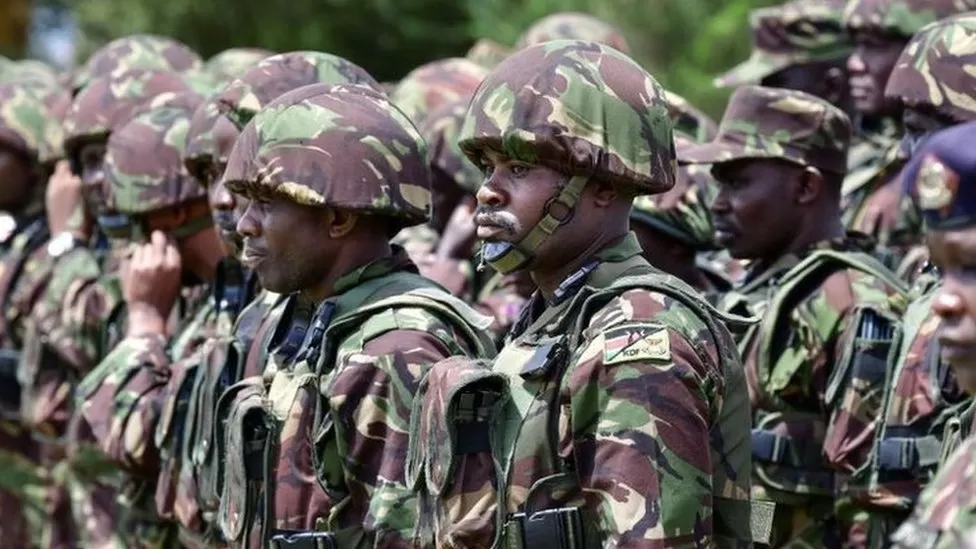After just 11 months in action, the East African force set up to to curb militia violence in the Democratic Republic of Congo has been ordered to leave the country.
The Congolese government said it would not extend the East Africa Community (EAC) Regional Force’s mandate after months of Kinshasa complaining about the group’s ineffectiveness.
The decision not to extend the troops’ stay comes as violence between the M23 rebel group and pro-government militias erupts in DR Congo’s troubled eastern region once more.
What was the regional troop’s mandate?
The East African Community (EAC) – a union of seven countries – sent its troops to DR Congo last year after a resurgence in fighting by the M23. The force was agreed shortly after DR Congo had joined the regional club.
Formed more than 10 years ago, the M23 has taken over large swathes of territory in the east, arguing that it does so to defend the interest of ethnic Tutsis against Hutu militias it says are backed by the government.
Burundi was the first of four countries to send its troops to DR Congo in August last year, followed by Kenya, South Sudan and Uganda, with Kenya in overall command.
The EAC’s Regional Force insists its mandate is to oversee the withdrawal of armed groups from captured areas.
However, the Congolese government and local communities want the force to engage in direct combat with groups like the M23.
The force was established to work alongside United Nations troops who were already in the country. The UN peacekeeping force, known as Monusco, has become increasingly unpopular for its failure to end the conflict during its 25-year deployment. President Félix Tshisekedi said he wanted Monusco to withdraw from the country in December.
In a recent statement, the EAC said its forces were dedicated to working closely with the government to enable the safe return of internally displaced people to their homes and enhance the overall protection of civilians.
Its mandate has been extended twice since the mission began.
Why does DR Congo want East African troops to leave?
The EAC’s soldiers have received repeated criticism from the Congolese government and civil society groups throughout their deployment.
President Tshisekedi has become one of the force’s main detractors. He has complained about the mission’s “lack of effectiveness”, issuing ultimatums for them to act more aggressively against the M23 or leave the country.
The failure to end the conflict has led to demonstrations against both the EAC force and Monusco. One such protest in September turned deadly, with more than 40 people losing their lives.
According to local media, Communications Minister Patrick Muyaya said: “The message is clear: the EAC regional force must leave the Democratic Republic of Congo by 8 December, as agreed, because it has not been able to resolve the problem, particularly that of the M23.”
What has the EAC force achieved?
Since entering DR Congo last year, the EAC force said it had overseen the withdrawal of armed forces from several areas like Karuba, Mushaki, Kiloriwe and Kitchange.
However, achieving complete stability has proven to be challenging. The force has faced logistical and operational difficulties.
On Tuesday, a mortar attack launched by rebels killed a Kenyan soldier attached to the force. He was the first Kenyan member of the force to be killed.
Earlier this month the EAC said its forces had faced hostilities because of propaganda perpetuated by armed groups.
Why has fighting resumed?
Dozens of armed groups have long plagued DR Congo’s mineral-rich eastern region.
After a precarious six-month truce, fighting resumed between M23 rebels and pro-government forces, known as Wazalendo, this month.
The government in Kinshasa accused the M23 of failing to disarm and uphold the ceasefire. The M23 in turned blamed pro-government forces for the resumption of the violence.
DR Congo’s army said it was still respecting the truce, but witnesses contest this, saying soldiers and pro-government loyalists have been fighting together against the M23.
Civilians have been caught up in the renewed violence – just last week at least 60 were killed in attacks on North Kivu’s Rutshuru territory, a local official said.
